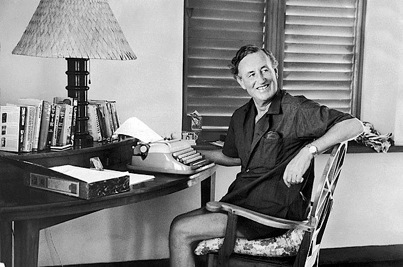A CENTURY OF U.N.C.L.E.
Thursday, May 28, 1908
Ian Lancaster Fleming is born in London.
Monday, April 5, 1909
Albert Romolo Broccoli is born in New York City.
Wednesday, May 26, 1909
Richard W. Maibaum is born in New York City.
Tuesday, April 29, 1913
Norman Francis Felton is born in London.
Wednesday, Oct. 27, 1915
Herschel “Harry” Saltzman is born in Sherbrooke, Quebec. Family moves to New York City when Harry is two years old.
Monday, Feb. 18, 1924
Samuel Harris Rolfe is born in New York City.
1930-32
Richard Maibaum hones playwriting talent as a student at the University of Iowa’s speech and dramatic arts department. He receives a Bachelor’s degree in 1931, Master’s in 1932.
1937-41
Norman Felton hones playwriting talent as a student at the University of Iowa’s speech and dramatic arts department. He receives a Bachelor’s degree in 1940, Master’s in 1941.
Friday, Jan. 6, 1950
Norman Felton and Harry Saltzman meet at NBC offices of Robert Montgomery Presents. Felton is director and Saltzman production manager for new live television dramatic anthology series premiering Jan. 30.
Monday, March 13, 1950
Barry Nelson, who will be the first actor to portray James Bond, appears with June Havoc in “The Egg and I” on Robert Montgomery Presents, directed by Norman Felton.
October 1951
Albert R. Broccoli and Irving Allen form Warwick Film Productions in London, producing adventure movies such as “The Red Beret” and “The Cockleshell Heroes” with screenplays written by Richard Maibaum.
Tuesday, Jan. 15, 1952 / circa
Ian Fleming — a reporter covering Soviet Russia for Reuters and The Times of London in the 1930s, assistant to Britain’s Director of Naval Intelligence during World War II, now foreign news manager for the London Sunday Times — begins writing the first James Bond novel at his Jamaican vacation home, Goldeneye.
Friday, Feb. 6, 1953
“The Naked Spur,” Metro-Goldwyn-Mayer picture starring James Stewart, Janet Leigh and Robert Ryan, opens. Gritty, adult western receives Oscar nomination for screenplay by Harold Jack Bloom and Sam Rolfe (his first movie work after breaking in writing radio and television scripts).
Monday, April 13, 1953
Casino Royale, the first James Bond novel, is published in England by Jonathan Cape.
Monday, April 20, 1953
Future James Bond film star Roger Moore appears with Phyllis Kirk in “World by the Tail” on Robert Montgomery Presents, directed by Norman Felton.
Monday, May 18, 1953
Roger Moore appears with Donald Woods in “The Wind Cannot Read” on Robert Montgomery Presents, directed by Norman Felton.
Friday, Oct. 9, 1953
Topper, starring Leo G. Carroll as Cosmo Topper, the stuffy banker haunted by fun-loving ghosts, premieres on CBS. Husband-and-wife actors Robert Sterling and Anne Jeffreys play the deceased George and Marion Kerby.
Tuesday, March 23, 1954
Casino Royale is published in America by Macmillan.
Thursday, Oct. 21, 1954
Abbreviated adaptation of Casino Royale airs 8:30 to 9:30 as a live television play on new CBS anthology series Climax. Barry Nelson stars as American secret agent “Jimmy” Bond; Michael Pate, future villain in U.N.C.L.E. and other spy shows, plays British agent Clarence Leiter; and the incomparable Peter Lorre is the evil Le Chiffre. Written for television by Antony Ellis and Charles Bennet.
1954 – 1956
Harry Saltzman produces half-hour filmed TV adventure series Captain Gallant of the Foreign Legion starring Buster Crabbe, shot on North African locations and at studios in Rome. Series premieres in the U.S. on Feb. 13, 1955, on NBC’s Sunday afternoon schedule.
March 1955
Producer Gregory Ratoff pays $6,000 for film rights to Casino Royale.
April 1957
From Russia, With Love, the fifth James Bond novel, is published in England.
Tuesday, July 23, 1957
Rank Organisation picture “Hell Drivers” is released in London, with fellow Scots Sean Connery and David McCallum and McCallum’s wife of two months, Jill Ireland, all in supporting roles. Patrick McGoohan, Herbert Lom and Stanley Baker have the lead roles.
September 1957
From Russia, With Love is published in America.
Saturday, Sept. 14, 1957
Have Gun – Will Travel premieres on CBS. Extremely popular western created by Sam Rolfe and Herb Meadow stars Richard Boone as polished, erudite gun-for-hire named Paladin. TV series runs for six seasons, with large portions of first three years produced by Rolfe. Radio version starring John Dehner as Paladin airs on CBS from 1958 to 1960. Gene Roddenberry and Bruce Geller write many TV episodes. Jerry Goldsmith is among CBS staff composers who score the series.
March 1958
Dr. No, sixth Bond novel, is published in England.
April 1958
Producer Harry Saltzman, director Tony Richardson and playwright John Osborne form Woodfall Film Productions in London, producing “kitchen sink drama” pictures such as “Look Back in Anger” and “Saturday Night and Sunday Morning.”
Spring 1958
Richard Maibaum becomes executive producer in charge of Metro-Goldwyn-Mayer’s television department.
June 1958
Doctor No is published in America (“Doctor” is spelled out in the title of the American edition, not abbreviated as in the British edition).
Wednesday, June 11, 1958
Robert Vaughn appears in the Wagon Train episode “The John Wilbot Story,” written by Richard Maibaum.
August 1958
Norman Felton becomes executive producer of CBS live and tape drama series produced in Hollywood, such as Playhouse 90 and the last episodes of Studio One.
Monday, Aug. 25, 1958
Leo G. Carroll stars in “Bellingham” on Studio One, playing a sedate English schoolteacher who is also a member of a group dedicated to assassinating world figures.
Tuesday, Dec. 16, 1958
“A Night to Remember,” lauded British film dramatizing the sinking of the Titanic, opens in the United States. David McCallum and Honor Blackman are among the picture’s large cast.
March 1959
Goldfinger, seventh Bond novel, is published in England.
Thursday, March 5, 1959
Robert Vaughn appears in the Playhouse 90 production “Made in Japan,” with Harry Guardino, E.G. Marshall and Nobu McCarthy.
Tuesday, May 19, 1959
“The Young Philadelphians” starring Paul Newman, with Robert Vaughn in his first major film role, opens in Philadelphia. Vaughn receives Academy Award nomination for his performance.
Wednesday, July 1, 1959
“North by Northwest,” spy adventure directed with knowing style and humor by Alfred Hitchcock, is released. With Cary Grant, the perfect comic-thriller lead, as a cynical advertising man mistaken for an American agent; Eva Marie Saint as the icy blonde of questionable loyalties; James Mason as the suavest of suave villains; and Leo G. Carroll as the droll U.S. Intelligence chief who uses Grant’s misfortune to trap Mason. Famous set pieces range from murder at United Nations that starts Grant on cross-country chase, to prairie crop-duster attack, to final battle across stone faces of Mount Rushmore. Smart dialogue by Ernest Lehman, terrific score by Bernard Herrmann, witty and inventive from start to finish. Heavily influences 1960s spy movies and television series.
July 1959
Ian Fleming writes first treatment for “James Bond of the Secret Service,” original story for feature film to be produced by his millionaire friend Ivar Bryce and Irish director Kevin McClory.
August 1959
Goldfinger is published in America.
Saturday, Oct. 3, 1959
Five Fingers, the first one-hour, network spy series, premieres on NBC at 9:30, starring David Hedison as American secret agent Victor Sebastian and Luciana Paluzzi as his fashion-model girlfriend Simone Genet. Series is quickly canceled, airing only 14 episodes of 16 produced.
November 1959
Fleming engages MCA as his agents in the United States.
November-December 1959
Fleming takes five-week world tour on behalf of the Sunday Times to write “Thrilling Cities” series of articles about major cities around the world.
January-February 1960
Fleming writes Thunderball at Goldeneye, basing it on the latest “James Bond of the Secret Service” draft received from McClory and his screenwriter Jack Whittingham.
Saturday, Jan. 16, 1960
Writers Guild of America goes on strike against Hollywood film studios.
Saturday, Jan. 30, 1960
Man From Interpol, a short-lived, British-made adventure series, premieres on NBC.
Saturday, March 19, 1960
WGA extends strike to television networks.
Wednesday, May 4, 1960
Richard Maibaum resigns as executive producer for MGM Television, citing growing conflict between his executive duties and his loyalty to the Writers Guild, and imminent prospect of the studio hiring non-guild writers or WGA scabs. “I have been wearing two hats and I have been increasingly unable to do it,” he tells Television Digest.
Friday, June 10, 1960
Writers strike ends after 21 weeks.
June 1960
Norman Felton forms privately held production company Arena Productions after agreeing to leave CBS to join MGM Television. Company is named after arena staging technique Felton developed during his theater career.
Friday, July 1, 1960
Norman Felton becomes director of programs for MGM-TV, with studio agreement to finance pilots for series to be owned 50-50 by MGM and Felton’s new Arena Productions.
Friday, Sept. 9, 1960
Robert Vaughn appears in “Remember Me Not” episode of ABC western series The Man From Blackhawk.
Sunday, Sept. 11, 1960
Danger Man, half-hour TV series starring Patrick McGoohan as NATO security agent John Drake, premieres in England at 7:30 p.m. on the U.K.’s commercial television network, ITV.
Wednesday, Nov. 23, 1960
“The Magnificent Seven,” popular western based on Akira Kurosawa’s “Seven Samurai,” opens. Robert Vaughn has another high-profile film role as one of the seven gunfighters led by Yul Brynner. The others are played by Steve McQueen, Charles Bronson, James Coburn, Brad Dexter and Horst Buchholz.
December 1960
Film producer Harry Saltzman takes a six-month option on all existing and future Bond stories with the exception of the previously sold Casino Royale.
next






